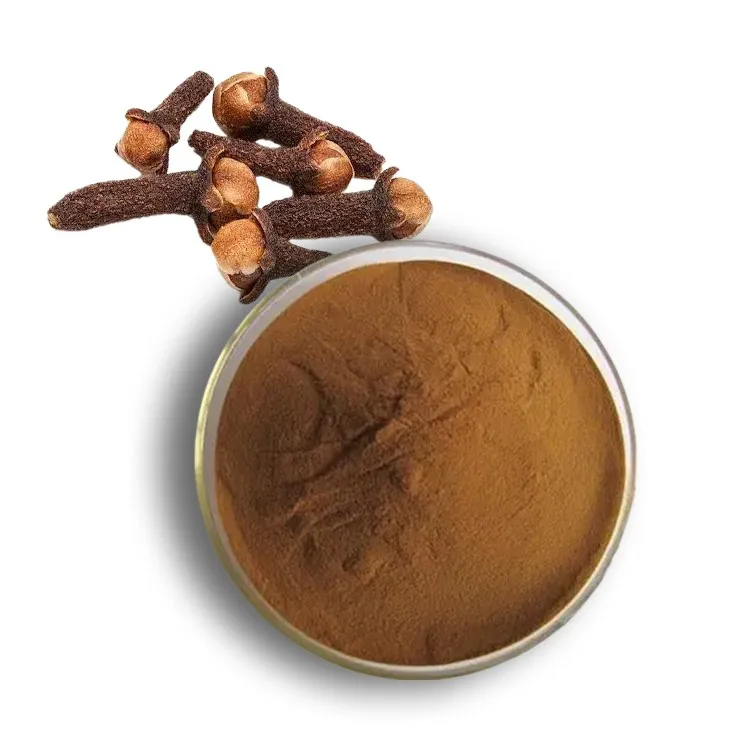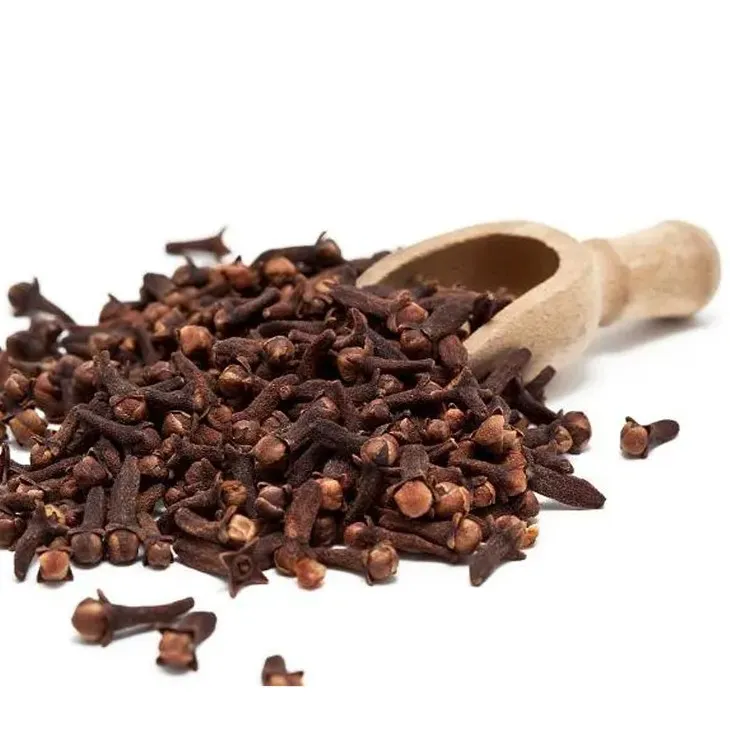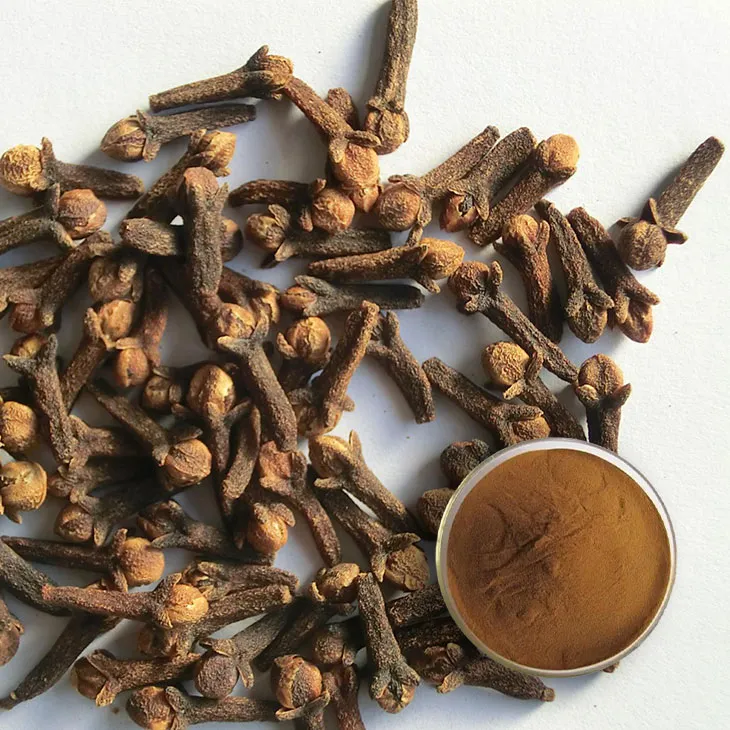- 0086-571-85302990
- sales@greenskybio.com
Understand the main processes of clove powder manufacturing in the food industry.
2024-12-22

Introduction
Clove Powder has become an important ingredient in the food industry, adding a unique flavor and aroma to various food products. Understanding the production processes of Clove Powder is crucial for ensuring its quality, safety, and consistent performance in food applications. This article will explore the main processes involved in the manufacturing of Clove Powder in the food industry.

Raw Material Selection
The first step in the production of clove powder is the careful selection of raw cloves. This is a critical stage as the quality of the final product is highly dependent on the quality of the starting material.
Quality Criteria
- Appearance: The cloves should be intact, without any signs of damage or mold.
- Size: Uniform size is preferred as it can ensure more consistent grinding and powder quality.
- Aroma: A strong and characteristic clove aroma is an indication of good quality.
Producers often source cloves from reliable suppliers who follow good agricultural practices. This helps to ensure that the cloves are of high quality and free from contaminants.

Cleaning
Once the raw cloves have been selected, the next crucial step is cleaning. The purpose of cleaning is to remove any impurities that may be present on the surface of the cloves.
Methods of Cleaning
- Mechanical Cleaning: This involves using machines such as sieves or air blowers. Sieves can separate out larger impurities such as dirt clods or stones, while air blowers can remove lighter debris like dust and small pieces of plant material.
- Washing: In some cases, cloves may be washed with clean water. However, this needs to be done carefully as excessive moisture can affect the subsequent drying process and may also lead to the growth of mold if not dried properly.
After cleaning, the cloves are usually inspected again to ensure that all visible impurities have been removed.

Drying
Drying is an essential process in the production of clove powder. It helps to reduce the moisture content of the cloves, which is necessary for long - term storage and for the grinding process.
Natural Drying
- Sun Drying: This is one of the traditional methods of drying cloves. Cloves are spread out in a well - ventilated area under the sun. However, this method has some limitations. The drying rate can be affected by weather conditions such as humidity and the amount of sunlight. Also, it may not be possible to achieve a very consistent drying level across all the cloves.
- Air - Drying Indoors: In this method, cloves are placed in a dry, well - ventilated indoor space. This can provide a more controlled environment compared to sun drying, but it may take longer depending on the air circulation and humidity levels inside the room.
Controlled Drying Techniques
- Hot - Air Drying: This is a more modern and efficient method. Hot air is blown over the cloves at a controlled temperature and humidity. This allows for a faster drying rate and more consistent drying results. The temperature needs to be carefully controlled to avoid over - drying or burning the cloves, which can affect the flavor and quality of the final powder.
- Dehumidifier - Assisted Drying: Using a dehumidifier in the drying chamber can help to remove moisture more effectively. This method is especially useful in areas with high humidity.
Regardless of the drying method used, the moisture content of the dried cloves is typically monitored to ensure that it reaches the desired level, usually in the range of 8 - 12% for optimal grinding and storage.
Grinding
After the cloves are dried, they are ready for grinding into powder. This is a key process that determines the texture and fineness of the clove powder.
Grinding Equipment
- Mortar and Pestle: This is a traditional grinding tool. It is suitable for small - scale production or for achieving a more coarse - grained powder. However, it is time - consuming and labor - intensive.
- Electric Grinders: In commercial production, electric grinders are commonly used. These can be adjusted to produce different levels of fineness. High - quality electric grinders can produce a very fine and uniform powder.
Quality Control during Grinding
- Particle Size Analysis: Regular checks are made on the particle size of the ground powder. This ensures that the powder meets the required fineness specifications. For example, in some food applications, a very fine powder may be required to ensure even distribution in the food product.
- Flavor and Aroma Preservation: The grinding process should not cause excessive heat generation as this can lead to the loss of the characteristic clove flavor and aroma. Therefore, proper cooling mechanisms may be incorporated in the grinding equipment or the grinding process may be carried out in short intervals to avoid overheating.
Quality Control and Packaging
Once the clove powder has been ground, strict quality control measures are implemented before packaging.
Quality Control Tests
- Sensory Evaluation: Trained tasters assess the flavor, aroma, and taste of the clove powder. Any off - flavors or abnormal aromas can indicate problems in the production process, such as improper drying or contamination.
- Microbial Testing: This is crucial to ensure that the powder is free from harmful microorganisms such as bacteria, yeast, and molds. Microbiological limits are set according to food safety regulations.
- Chemical Analysis: Chemical components such as eugenol content (which is responsible for the characteristic clove flavor) may be analyzed to ensure consistency in quality.
Packaging
- Packaging Materials: Clove powder is usually packaged in materials that provide protection from moisture, air, and light. Common packaging materials include plastic bags, laminated pouches, or glass jars.
- Labeling: The packaging must be labeled accurately with information such as the product name, ingredients, net weight, production date, and expiration date. This information is important for consumers and also helps with traceability in the supply chain.
Conclusion
The production of clove powder in the food industry involves several important processes, from raw material selection to packaging. Each process plays a vital role in ensuring the quality, safety, and consistent performance of the final product. By following strict quality control measures at each stage, producers can ensure that the clove powder meets the high standards required in the food industry, providing consumers with a high - quality ingredient for various food applications.
FAQ:
1. What are the key factors in the selection of raw cloves for clove powder production?
The key factors include the appearance of the cloves, such as their size, shape, and color. Cloves should be intact, without any signs of damage or mold. The aroma intensity also plays a role; stronger - scented cloves are usually preferred as they indicate a higher content of essential oils, which contribute to the flavor of the clove powder.
2. How does the drying process affect the quality of clove powder?
The drying process is crucial. If dried naturally, it may take longer but can preserve more of the natural flavor compounds. However, it is also more susceptible to environmental factors like humidity and temperature fluctuations. Controlled drying techniques, on the other hand, can ensure more consistent drying conditions. If the drying is not done properly, the cloves may not dry evenly, leading to problems in grinding and a potential loss of flavor, or even the growth of mold during storage, which would significantly affect the quality of the resulting clove powder.
3. What kind of quality control measures are implemented during the grinding process?
During the grinding process, the particle size is closely monitored to ensure a fine and consistent powder. Equipment calibration is important to maintain a constant grinding force and speed. Also, samples are regularly taken to check for the presence of any large particles or unground bits. The temperature during grinding may also be controlled as excessive heat can cause the degradation of flavor - related compounds, so measures are taken to prevent overheating and ensure the flavor and texture of the clove powder remain consistent.
4. How are food safety and quality standards met during the packaging of clove powder?
The packaging materials used must be food - grade and suitable for protecting the clove powder from moisture, air, and light. Before packaging, the powder is usually checked for any contaminants or foreign particles. The packaging environment is also maintained in a clean and hygienic condition. Labels are placed on the packages clearly indicating ingredients, production date, expiration date, and any relevant handling instructions, all of which are important aspects of meeting food safety and quality standards.
5. Why is consistency in flavor and texture important for clove powder?
Consistency in flavor and texture is crucial because it allows for reliable use in various food products. In baking, for example, a consistent flavor ensures that the end - product has the expected taste every time. In spice blends, a consistent texture ensures that the powder mixes evenly with other ingredients. If the flavor or texture varies, it can lead to inconsistent results in the final food product, which may not meet consumer expectations.
Related literature
- Clove Powder Production: A Comprehensive Guide"
- "Quality Control in Clove - based Food Products Manufacturing"
- "The Role of Clove Powder in the Food Industry: Production and Standards"
- ▶ Hesperidin
- ▶ citrus bioflavonoids
- ▶ plant extract
- ▶ lycopene
- ▶ Diosmin
- ▶ Grape seed extract
- ▶ Sea buckthorn Juice Powder
- ▶ Beetroot powder
- ▶ Hops Extract
- ▶ Artichoke Extract
- ▶ Reishi mushroom extract
- ▶ Astaxanthin
- ▶ Green Tea Extract
- ▶ Curcumin Extract
- ▶ Horse Chestnut Extract
- ▶ Other Problems
- ▶ Boswellia Serrata Extract
- ▶ Resveratrol Extract
- ▶ Marigold Extract
- ▶ Grape Leaf Extract
- ▶ blog3
- ▶ blog4
- ▶ blog5
-
Pure 85% Tomentil Extract.
2024-12-22
-
Beetroot juice Powder
2024-12-22
-
Bamboo Leaf extract
2024-12-22
-
Cat Claw Extract
2024-12-22
-
Horse Chestnut Extract
2024-12-22
-
Ivy Extract
2024-12-22
-
Genistein
2024-12-22
-
Uridine-5'-monophosphate Disodium salt
2024-12-22
-
Avocado Extract Powder
2024-12-22
-
Lotus leaf extract
2024-12-22
-
Astaxanthin
2024-12-22





















